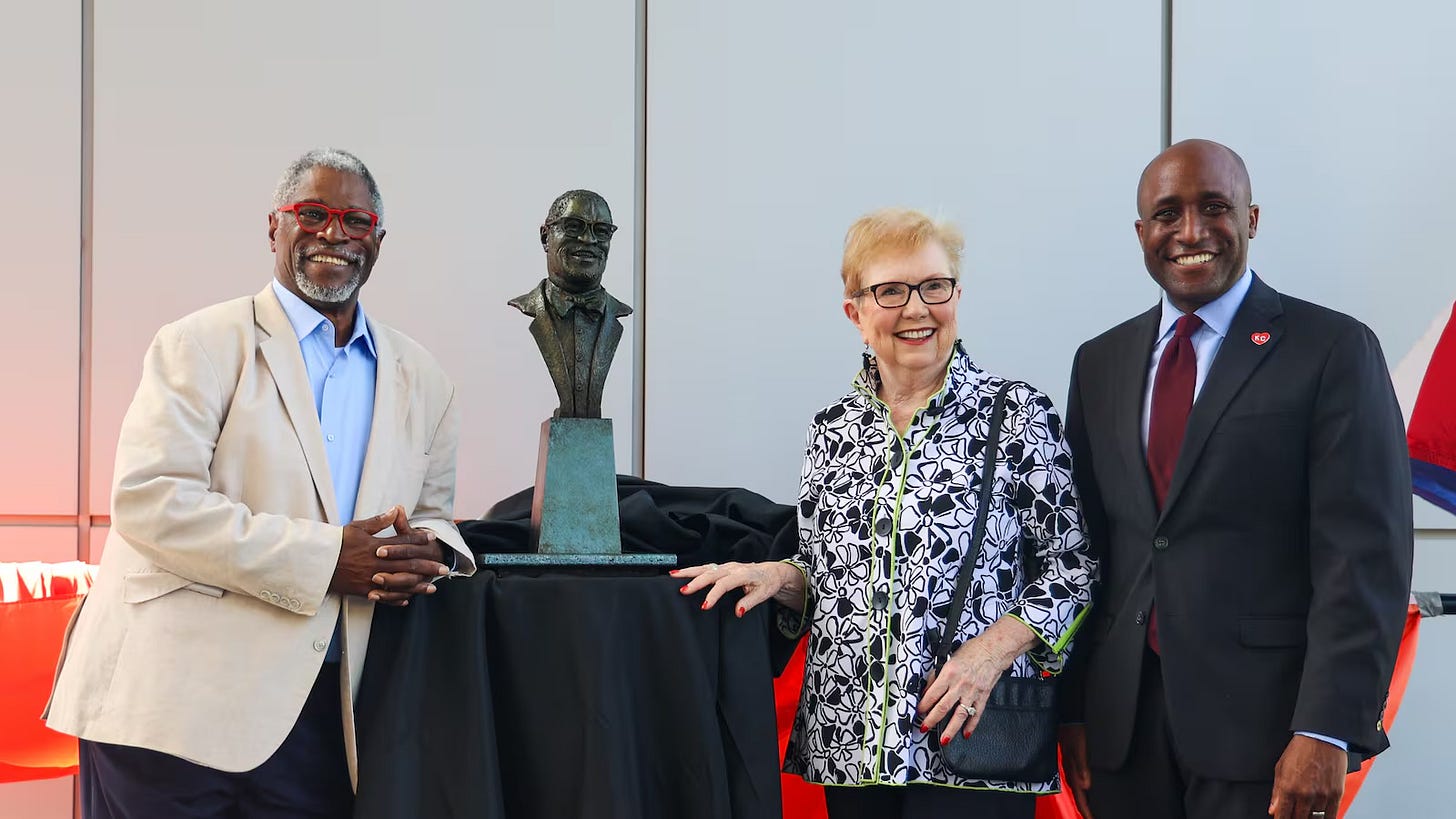Taking The Long View
Elections reset the board. Civil Society can keep the game going.
(Kansas City Mayors Sylvester “Sly” James, Kay Barnes, and Quinton Lucas. Pic Courtesy of KCMO)
Only a robust civil society—citizens, nonprofits, foundations, and businesses in concert with government —can keep progress alive after any election cycle resets community priorities.
In 1999, John Gardner warned us, "Cynicism, alienation, and disaffection do not move problems toward solution. We need a powerful thrust of energy to move this nation through a rough patch, and much of that energy will have to come from the citizens themselves."
Cynicism, alienation, and disaffection are not new to the American experience. Those feelings weigh heavier on those pushed to the margins by income, race, identity, or geography.
The antidote is positive change that people can see and feel. But that takes time, well beyond the term of any elected official.
And when priorities shift too rapidly, the momentum is lost. People get cynical over broken promises. The negative spiral continues.
A Mayor's Term vs. the City's Future
The problem became clear when I attended a celebration of my friend, Mayor Sylvester "Sly" James of Kansas City.
Our current Mayor, Quinton Lucas, honored Sly by naming a pavilion after him and unveiling a sculpture model to mark the spot.
Many showed up for the celebration—old friends, old enemies, and frenemies. It was great to see so many people who wanted to make the community a better place, albeit from diverse perspectives.
A small group of us went to dinner that night with Sly, and we talked openly and candidly about how tough it is for elected officials to pursue long-term ideas.
As I drove home, I reflected on my career and how many things that had great promise were cut short when leadership, elected and otherwise, changed.
Then I opened a blog that keeps me connected to the underbelly of KC's politics, and a commentator posted "Sic transit gloria mundi" to describe Sly's honor.
A quick Latin refresher - it's a reminder of the fleeting nature of worldly fame, power, and achievements.
So many times this year, I've asked myself, "Does any of this matter?"
Yet, I've worked with so many talented people. Progress was made. We can learn from what didn't work, and push for more durable solutions.
Bowties and Achievements
Some, including his Wikipedia intro, try to reduce him to a bow tie, but KC knows the real Sly.
There's more to him beyond the snappy style. He is a musician, a Marine, an attorney, a business owner, a father, and a grandfather.
As Mayor, he led the charge for change in many areas. He'd be the first to tell you he didn't do it alone (and it was nice of him to give his staff and me a shout-out during his remarks).
Under his administration, he won 16 out of 18 elections, which helped improve access to healthcare, public safety, infrastructure, and transportation. These included:
Invested $800 million in infrastructure repairs, including streets, bridges, and sidewalks
Replaced the outdated KCI terminals with a new airport
Launched the streetcar starter line, now connecting our riverfront to our university (and it's free to ride)
But what he was most passionate about was helping kids.
That passion drove him to raise money for MLB's Urban Youth Academy for baseball and softball, and to launch Turn the Page KC, a program aimed at improving reading skills by the end of third grade.
Regrets - We have a few.
I regret three key things for all Sly did and what we did as a team with him.
Early momentum on crime reduction through a collaborative program didn't live up to potential. It wasn't great, but it was making progress. Leaders had a good idea of how to improve it. Unfortunately, a change in police chief changed the entire direction and led to a loss of community trust.
We lost the election to extend the streetcar into KC's historically black neighborhood, the East Side. Decades of broken promises and the fear of displacement and gentrification made it a nonstarter for voters there. But the death knell came from our more liberal voting area, which didn't want "those people" (literal quote from a forum) to have easier transportation access to KC's posh Country Club Plaza.
We lost an election to fund universal pre-Kindergarten. I've written about its importance and voters' rejection of it in KC. It stings Sly, and it hurts to write about it.
Who picks up the pieces of successes and regrets after someone leaves office? Enter civil society.
The Case for Civil Society
Civil Society is where volunteers, citizens, foundations, individual donors, associations, and nonprofits join forces with government (public action for the public good) and businesses (private action for the private good) to work together more effectively.
I recently presented with a colleague on regional economies and the need to adapt our education approach to help more people prepare for tomorrow's careers. The room was full of successful retired CEOs, business owners, attorneys, and accountants.
They gather monthly at breakfast to learn and influence positive change where they can.
They were highly engaged, asked great questions, and left seemingly motivated to support ideas and issues to help students and our community move forward with a better approach to our regional economy.
A strong civil society begins with engaged and deeply informed leaders from diverse backgrounds, including different ages, races, genders, identities, and geographies.
In his "The Bill of Obligations: The Ten Habits of Good Citizens," Richard Haas outlines our key responsibilities as we work for a better world.
You can get more details in his book, but here's the short list:
Be informed
Get involved
Stay Open to Compromise
Remain Civil
Reject Violence
Value Norms
Promote the Common Good
Respect Government Service
Support the Teaching of Civics
Put Country First
Civil society players, starting with individuals, are the ongoing glue to hold things together in the best and worst of times.
Currently, we need to activate a civil society with a long-term perspective to pick up the pieces of what the administration has already done, including the decimation of funding to nonprofits that deliver essential services.
Daniel Stid wrote about the background and the impact of the current Administration's approach in the first of his two-part series, "Gradually and Then Suddenly: The Sixty-Year Crack-up of Federal Funding for Nonprofits."
I'm eager to see what he writes for the second half of his series, and I'll share my thoughts and reaction to that in a future piece.
Coming up on B Positive
Over the next few weeks, we’ll transition from the abstract case to practical civil society playbooks, starting with how foundation boards can think long-term, then tackling civic challenges related to race, and finally exploring concrete community solutions.
Next Friday, I’ll take a pause and reflect on the July 4th holiday.
Week 2: "The Black Box" - what foundation boards and senior leaders can do to move from safe and short-term thinking.
Week 3: "Race Without Performance Art" - how foundations and nonprofits can address more abstract issues, such as a grown-up conversation about race.
Week 4: "Building With a Difference" - how foundations and nonprofits can address the everyday issues in our communities, like the housing crisis.
Reading Recommendations
I read a lot to learn a lot.
This week, I've been digging into many readings on the Israel/Iran war and America's involvement in it.
Heather Cox Richardson, as always, cataloged the immediate aftermath of America's bombing run and provided historical perspective.
For a more center-right view, consider Walter Mead in the WSJ, or this piece on AEI's site by Matthew Continetti about the lack of a coherent response from Democrats.
On a different note. Read this tribute to Speaker Melissa Hortman. There are a lot of good elected officials out there, like Speaker Hortman (and Sly!). We need more of them.
Today’s Action(s)
#1 on Haas's list is Be Informed. Makes sense. But how?
Familiarize yourself with the national news landscape. I find this bias sheet pretty reliable.
Research and sign up for a local news source. Here's a handy-dandy directory.
And check out your local PBS and NPR websites for quality news. Both offer strong reporting, but are currently under attack and at risk of losing funding that has already been promised.





Larry, you honor me with your kindness. Thanks. Stay Frosty!